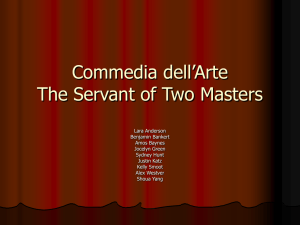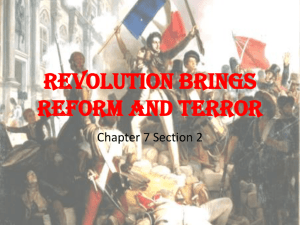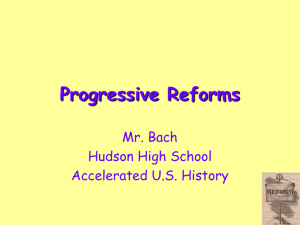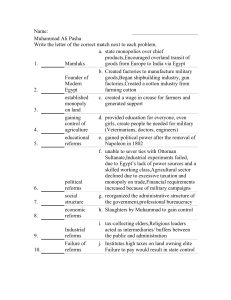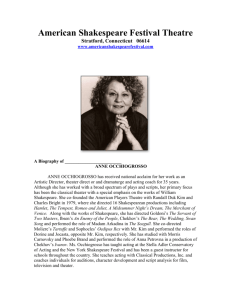The XVIII Century
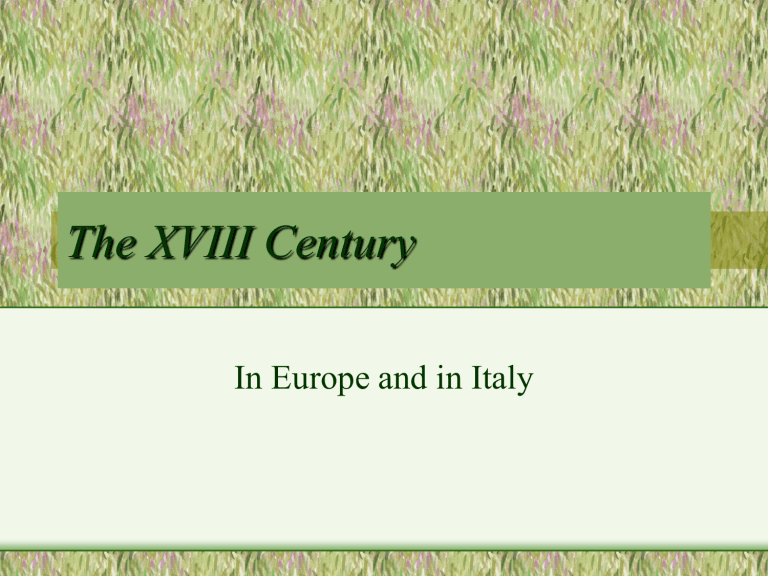
The XVIII Century
In Europe and in Italy
From Absolutism to the Enlightenment
• 1685 King Luis XIV abolishes the Edict of Nantes (freedom of religion)
• French absolutism against English Liberalism
• 1688 Bill of Rights (Locke’s Treatises on Civic Government
1690)
• 1713 The Treaty of Utrecht (1714) and Rastadt sanction the primacy of England over France and Spain
• In Italy: the Duchy of Milan assigned to Austria, Mantua and Sicily to the Kingdom of Naples, Sardinia to Piedmont
• 1733-38 Polish war of succession, end of peace period
•
1738 Peace of Vienna and new political situation for Italy
• The South is assigned to Charles I Bourbon, King of
Two Sicilies; Tuscany goes to the Lorraine dynasty
• The King of Sardinia extends his dominions in
Piedmont
• Parma and Piacenza go to the Bourbon family (Philip,
Charles’ brother)
• European monarchs introduce legislative innovations and reforms; centralization of power remains (influence of new philosophical movement)
•
•
Reformist monarchs: Frederick II, Catherine II, Maria
Theresia (1740-80) and Joseph II (1780-90)
Poland is dismembered (1773-95) and divided among Prussia,
Russia and Austria
England: problems in the American colonies
France: internal problems, centralization of power, new emerging social class, Enlightenment, French Revolution
Bourgeois Virtues
• 1712 The Spectator Joseph Addison and Robert Steele: dissemination of mundane and lay values (educational purposes) a) celebrates the values of trade and commercial activities b) proposes equilibrium and tolerance in human relations, measure in behavior c) dedicates articles to “the good housewife” and to
“conjugal love and marital responsibilities” d) provides spiritual guidance
•
1719 Daniel Defoe publishes Robinson Crusoe: first self made man of English literature.
• 1721 Montesquieu’s Persian Letters. A critical analysis of all aspects of society and its institutions. Reason is used to render relative all official and “sacred” values
• 1735 Ludovico Antonio Muratori’s Moral Philosophy harshly criticizes the aristocracy and its ideological elitism (nobility is not in the blood)
• Over the years, the increased amount of commercial trade over the Atlantic gives rise to the English, Dutch and French mercantile class
• The new class, the Bourgeoisie, introduces its values: hard work, determination, self-confidence, freedom, mobility, intelligent management of wealth, equality
•
The antagonist of the new class is the nobility, whose wealth is based on land ownership and others’ labor
•
Daniel Defoe conceptualizes the virtues and values of the self-made man. Robinson possesses the economical, cultural as well as the ethical dimensions of the new class
• The new class needs a new political and economical system in which to flourish. Recognition of itself as a rightful component of society. Need for political representation
•
Reformist movement is driven by the new class and its increasing desire to change state ideology
• The new class denounces the inadequacy of the old system and calls to abolish a) the ecclesiastic rule over properties b) the law that restricted the mobility of patrimony c) high custom fees d) corporate restrictions on crafts and professions
•
Reform movement initiates at the beginning of XVIII and culminates (the last three decades) in the
The Age of Enlightenment
•
It is not a uniform, monolithic, but European movement
• It receives impulse and stimulus in particular from French philosophers (Descartes, Voltaire, Montesquieu, Diderot)
• Mandatory readings for all Europeans (women included)
• French culture and language dominate Europe
• MAIN TENETS (CONSTANT VALUES)
• Primacy of REASON as fundamental instrument of knowledge of reality and criterion to follow in the organization of social and individual life (Descartes’ rationalism - Locke’s empiricism)
•
Refusal of any irrational impulse (religious-emotional)
•
Social utility as the final goal of every individual activity
•
Individual social utility in light of the common good touches all classes, from the “prince” to the commoner
(all must contribute to the “public happiness”
•
A new concept of the intellectual and of the artist who is not only competent in his area but possesses intellectual curiosity and versatility, has many interests
(the encyclopedia as example) Voltaire is philosopher, historian, playwright; Pietro Verri wrote on economics, politics and aesthetics
•
A constant optimism and confidence in the inevitable progress ushered in by science, technology and new discoveries. A profound trust in culture
•
The certitude with which the philosophers of the time went about, with their superior irony, to deconstruct the old system. For these men the darkness of past times was being dissolved by the light of Reason
• VARIABLES
• The varying positions regarding religion (from
Helvétius’ atheism to Voltaire’s deism)
• Different positions regarding the state (from
Montesquieu’s parliamentary model to Rousseau’s direct democracy and sovereignty of general will)
•
Valorization of emotions and affections, theorization of the sentimental component (Rousseau)
The Italian Panorama
•
Milan: Maria Theresia involves the most enlightened
Italian intellectuals in her state reforms
•
Intellectuals collaborate closely with political and juridical powers to form the new state structure a) Pompeo Neri : compiled the “catasto” b) Gian Rinaldo Carli: President of the economic council c) Pietro Verri and Cesare Beccaria: important administrative functions d) Giuseppe Parini: directed the “Gazzetta di Milano” and, under Joseph II, was superintendent of public schools
• Beccaria, Alessandro and Pietro Verri: directed “Il caffè”
Italian Enlightenment
•
Main Reforms
• Fiscal reforms (introduction of real estate taxesreduction of income taxes)
• Administrative reform: division of territory into provinces and townships
•
Abolition of tax collectors
• Abolition of exemption for ecclesiastical property
• Abolition of law prohibiting property division and sale
• Expulsion of the Gesuites from schools, creation of public education
• Suppression of the Tribunal of the Inquisition
THE KINGDOM OF NAPLES
•
The same intellectual power as Milan
• Reforms were not put in place
• Strong opposition of the barons who defended their territorial (feudal) and legal privileges
• The parasite life they led had obliged them to sell most of their feuds to parvenus of different extractions: peasants, merchants, professionals
•
This new class does not have the political strength to abolish the old privileges
•
Legal and economic reforms were not implemented as in Milan. Commerce and free trade were halted
•
Fiscal reforms are realized but are insufficient
VENICE
• Cultural and intellectual interest for the new ideas coexist with political immobility
• Economic and political weakness. Loss of territory overseas, loss of political influence
• New role in publishing. High circulation of cultural novelties
• The cultural stimulus does not translate into political action. The aristocracy does not foster reforms that could alter the power structure
PIEDMONT
•
The Savoy dynasty displays diplomatic ability on the international scene; through shrewd alliances Piedmont makes territorial gains
•
1748 Peace of Aachen Charles Emanuel III acquires the western part of the Duchy of Milan
•
Vittorio Amedeo II modernizes the administration by a) abolishing ecclesiastical privileges b) rationalizing the “catasto” c) restructuring the fiscal system d) improving the university of Turin e) ameliorating the educational system
•
Under Charles Emanuel III and Vittorio Amedeo III reforms are halted
GENERAL CONSIDERATIONS
• The rapport between intellectuals and power is not ideal
• The ferment and reforms of the century result in the
French Revolution. The violence of the event produced a process of reflection in the intellectuals
• The revolution imposed a stringent evaluation of all mental categories, theoretical premises and political orientations
•
Many intellectuals were frightened by revolutionary extremism
•
Return to reactionary systems. Reforms were halted
The French Philosophers
• Charles de Sécondat, baron of Montesquieu (1689-1755)
• François Marie Arouet, Voltaire (1694-1778)
•
Jean Caritat, Marquis de Condorcet (1743-1794)
• Jean Jacques Rousseau (1712-1778)
•
Denis Diderot (1713-1784)
• Jean Le Rond D’Alambert (1717-1783)
Great Thinkers of the Century
• George Berkeley (1685-1753)
•
Count of Shaftesbury (1671-1711)
• Abbé de Condillac (1714-1780)
•
David Hume (1711-1776)
• Adam Smith (1723-1790)
•
Immanuel Kant (1724-1804)
• Isaac Newton (1642-1727)
•
Gottfried Wilhel Leibniz (1646-1716)
• Gianbattista Vico (1668-1744)
CARLO GOLDONI
•
1707 born in Venice (father is a physician)
• First studies in Perugia and Rimini
• Studies Law in Pavia
• 1731 law degree from Padua university
• Lawyer in Venice, writes plays (Momolo cortesan, La
donna di garbo)
• 1748-52 Following the success of his comedies works for the Medebac theater company (Teatro Sant’Angelo)
• Theater is a profession that must be taken seriously, to derive from it honor and profit. He is an independent author; establishes strong link between work and audience
• The period of Goldoni’s major activity coincides with the decisive phase of theEnlightenment
• 1753-62 works for the Teatro San Luca
•
Polemic with Pietro Chiari and Carlo Gozzi (in his comedies Goldoni has represented the limits of
Venetian society)
• 1762-1771 works for the Comédie italienne
• 1773-8 writes his Mémoires
•
1793 dies, almost indigent, in Paris
The Commedia dell’arte and Its Reform
• The Commedia dell’arte, a form of Italian theater popular in Europe at the time, had lost its original and sanguine energy
•
It had turned into a sterile search of the effect
•
Had not renovated its content, themes and characters
•
Its comical situations had become repetitious and unoriginal
•
The comedic canvasses were not updated, the audience already knew the outcome of the plot
•
The laws of verisimilitude had been lost
•
Plots would follow no reasonable thread
Goldoni’s Reform
• In the Author’s Preface to his first collection of plays:
“the two books on which I have most meditated and that I will never repent having read are the World and the Theater”
• The World: the inexhaustible and various spectacle of daily life, the variety of human behaviors, attitudes, social relations, the “curious accidents,” the “vices and defects that are so common n our century and in our nation”
•
The Theater: a specific form of representation, a literary genre that has rules and modalities by which it is possible to reach certain effects in the audience: marvel, laughter and that soft tickling of the heart
• that derives from seen oneself represented on the stage, vices and virtues naturally placed, with delicate hand, so that nobody will feel insulted
• In another text Goldoni states: “Comedy has been invented to correct the vices and to ridicule bad habits”
• The moral and civil component of Goldoni’s theater is evident
• “Commedia is an illusion of reality obtained with a representation that tends to illustrate to the audience reality’s true aspects
• The recognition of such reality is the gauge of the value, also aesthetic value, of the commedia
• “By searching for the audience’s awareness the commedia refines both its enjoyment and critical skills”
• With the attention to both mundane reality and on the effects this has on the audience, Goldoni leads a battle on two fronts a) against the precepts of the Arcadian poets b) against the stereotyped “improvisations” of the
“comici dell’arte”
• On the linguistic level the comical form regains its freedom, its pure and popular form, derived from the daily reality of life
Italian or Dialect
•
Dialect is seen by Goldoni as dialogical reality and fertile soil in which the characters construct and elaborate their relations
• Goldoni’s language rests on its vivacity and movement, on the moods of daily conversation, it is built as a
“superdialect,” in which Venetian prevails but other
Northern dialects converge
• For Goldoni reform means to substitute reality to the mannered stereotypes of Commedia dell’arte and to assign literary activity a distinct moral intention
•
His reform is a revolution in the content and form
•
His enlightenment is not based on theoretical conceptualization, rather on popular common sense
•
Fundamental in Goldoni are a) the confidence in the rationality of an immutable
Nature (which is “everywhere the same”) b) a deep sympathy for human nature, and for a human
“myth” in which measure and judgement prevail c) the refusal of any heroic or agonistic dimension, the adherence to the century’s “pacifist spirit” d) the profound sympathy for the entrepreneurial bourgeois whose activity produces wealth for himself and for others
Technical Aspects of the Reform
•
The introduction of a written text: no more space left to the actors’ improvisation
• The transformation of the masks in characters: from the rigid type, stylized mask that represents always and only itself (a predetermined vice or virtue)
•
Masks could not be developed further, not possessing the warmth and passions of real people
•
Masks cannot show their feelings, the passions that move them inside, just because the black cover will not consent it
•
The comical to which Goldoni aspired is not superficial and external, but derived from the careful observation of the world, its errors and weaknesses
•
Avarice, pride, love, aristocratic manias are represented within the reality of the individual, in the unrepeatable specificity of its personality
• In Goldoni’s commedie there is not THE MISER, not
THE ARROGANT or the “RUSTEGO,” but that particular miser, that particular arrogant and
“rustego”
•
Eliminating the mask means to conceive the character in evolution, in motion, freeing him from the stiffness and rigidity of a given form
• By eliminating the mask and by introducing the script,
Goldoni allows his characters to acquire a psychological dimension, to move freely in the sentimental realm
•
Creating a real character means, for Goldoni, represent the reality of the little people, the new emerging small mercantile class
